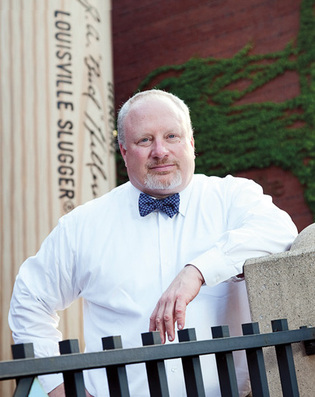 loading
loading
Where They Are NowExotic, at homeThe alumnus who made Louisville hot.  Jessie Kriech-HigdonRowan Claypool ’80 (shown outside the Louisville Slugger museum and baseball bat factory) has made his hometown a hot summer destination for Yale students. View full image
Twelve years ago, Rowan Claypool ’80 founded Bulldogs in the Bluegrass, a summer program in Louisville, Kentucky, that places Yale students in internships in business and nonprofits. It has since blossomed into Bulldogs Across America, in nine cities. Y: How did this all begin? C: There was an emerging sense that Louisville, like lots of heartland communities, was losing the best and brightest to places like Yale and needed a systematic way to regain them. Y: Were there many Yalies in Kentucky at the time? C: There was not a Yale College graduate younger than 35 living in Louisville in the summer of ’99. There had been 14 years of zero in-migration. Twelve years ago, this topic of brain drain in Kentucky was something that caused everybody to sort of sit up and say, Oh my gosh, how are we gonna be a thriving economic engine if we’re losing a significant portion of bright young folks? I just dreamed up something to attempt to address it. Y: How is the Bulldogs program structured? C: There are four pillars: one is meaningful work. Two is the group experience. The third one is that we try to showcase how the community works behind the curtain, and the fourth is that each gets an assigned adult mentor—basically an adult who volunteers to befriend one of these kids. Y: And what is the young Eli population of Louisville today? C: We’ve had at least 45 Yalies move to town and be gainfully employed at least a year. We’ve reversed the trend, and made Louisville an attractive place to come after graduation. The brain drain was the reason to start it, but we’ve found there are other reasons to continue it. Each of the Bulldogs has a high likelihood of having a significant transformational experience during the summer. Yale would never have predicted this kind of program would be invented, and certainly not in Louisville. Y: Bulldogs in the Bluegrass wound up being the blueprint for something bigger: Bulldogs Across America, which now has internships in Cleveland, San Francisco, Denver, Minneapolis, Houston, New Orleans, Santa Fe, and St. Louis. C: You plant where the ground is fertile. It was fertile in Cleveland, it was fertile in San Francisco. You find alums who have a combination of civic interest and interest in Yale, and you give them a playbook. Roughly ten percent of Yale undergraduates are participating in the program before graduation. Last year, a group of Yale undergraduates as big as Davenport College applied. We’re pulling them to places they’d never thought of spending their summer. Y: Students are paid $2,700 and get free housing in all the programs? C: It varies from city to city. We’ve had something like 930 who’ve been across America, and something like 400 who’ve come to Louisville. Y: What are some of the most meaningful moments you remember? C: At the end of the summer of 2004, one of the students had a profound summer of finding herself. And she gave a speech about how, throughout the summer, I’m always showing up with watermelons. Y: Why all the watermelons? C: I can bring a watermelon over in the evening, cut it out on a picnic table, and the Bulldogs will come out and eat. They wouldn’t call me up and tell me how the day went, but if I show up with watermelon, that way I get to know the group. I get to interpret the adult world for them. And I just enjoy watermelon. Y: You’ve called Louisville an “exotic land.” Really? C: What is exotic? It’s the thing that’s unknown. Typical Yale undergrads will know a ton about Europe and not a thing about Kentucky. If you go to Thailand, you’re always in Thailand, but if you go to Kentucky, you have to develop a subtler ear for culture—because it’s different, but it’s your own country. Y: How did you spend your own summers in college? C: I poured concrete in Mississippi. I worked with six Mississippi rednecks. We’d dig these holes and pour concrete footings, so by the end of the week you couldn’t even see what you’d done all week. I’d spend long, hard, hot days digging holes and listening to this guy named Buddy, who was missing most of his teeth. These guys had unique intelligences—they could find the down-low liquor store in all the towns just by smell. I’d had a tough sophomore year, and had arranged a leave of absence, but there was something very healing about watching the cotton grow that summer. What I observed in my life at Yale was very helter-skelter: I was always pushing myself; I was never balanced. The cotton, though, grew just the right amount each week, and it grew in a very steady, organic way—never rushed. That was a wonderful metaphor for my healing. I decided not to take the leave of absence. I was ready to go back to Yale, and I had tremendous junior and senior years.
The comment period has expired.
|
|